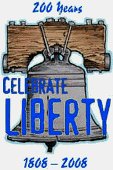Article from: www.thenewspaper.com/news/37/3780.asp
5/1/2012
Kentucky Supreme Court Strikes Down City Sticker Roadblock
Justices in Kentucky blast city sticker roadblocks as a revenue raising exercise.
 Liberty may not set up roadblocks for the purpose of issuing tickets for failure to display a city sticker on an automobile, the Kentucky Supreme Court unanimously ruled last Wednesday. The city had required all 1850 residents and anyone working within the city limits to purchase a sticker for $10 and display it on their automobile.
Liberty may not set up roadblocks for the purpose of issuing tickets for failure to display a city sticker on an automobile, the Kentucky Supreme Court unanimously ruled last Wednesday. The city had required all 1850 residents and anyone working within the city limits to purchase a sticker for $10 and display it on their automobile.
When teachers at a local school failed to pay for a sticker, town leaders had police set up a roadblock to issue them citations. Cars with a sticker were allowed to pass through the checkpoint, while drivers of stickerless vehicles were interrogated about where they lived and where they worked. Joseph A. Singleton was stopped at this checkpoint and when police searched his car they found a small amount of marijuana. Singleton moved to suppress the evidence on the grounds that police had seized him without probable cause or articulable suspicion, in violation of the Fourth Amendment.
The Casey County Circuit Court agreed the sticker roadblock was unconstitutional, but the state Court of Appeals saw no problem with it. In the final word on the case, the high court's seven justices agreed that Liberty lacked a substantial reason to detain motorists.
Through a series of decisions, the US Supreme Court has authorized suspicionless roadblocks for the purpose of finding illegal aliens up to 100 miles from the border, verifying drivers' licenses and registrations, looking for drunk drivers and responding to a specific crime that took place on the same highway as the roadblock. A dozen states have disagreed with these practices and outlawed one or more of these types of roadblocks by citing their own state constitutions. The Kentucky Supreme Court found none of these exceptions applied in the case at hand.
"The checkpoint's only purpose was to enforce a revenue-raising tax upon vehicles in the city," the court ruled on Wednesday. "Thus, the checkpoint to enforce the sticker ordinance comports with none of the purposes which the United States Supreme Court has found to be important enough to override the individual liberty interests secured by the Fourth Amendment."
The justices went on to blast Liberty for selecting the most intrusive means possible to achieve its stated goal.
"We also recall that the initial concern that sparked the need for the checkpoint was the report that some teachers had failed to pay the sticker fee," the justices ruled on Wednesday. "That concern could have been addressed by means far less intrusive than a traffic checkpoint. For example, police officers could have simply walked through the school parking lot and cited cars without a sticker."
A copy of the decision is available in a 1.1mb PDF file at the source link below.
Source: Singleton v. Kentucky (Kentucky Supreme Court, 4/25/2012)
Permanent Link for this item
Return to Front Page
 Liberty may not set up roadblocks for the purpose of issuing tickets for failure to display a city sticker on an automobile, the Kentucky Supreme Court unanimously ruled last Wednesday. The city had required all 1850 residents and anyone working within the city limits to purchase a sticker for $10 and display it on their automobile.
Liberty may not set up roadblocks for the purpose of issuing tickets for failure to display a city sticker on an automobile, the Kentucky Supreme Court unanimously ruled last Wednesday. The city had required all 1850 residents and anyone working within the city limits to purchase a sticker for $10 and display it on their automobile.